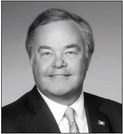New legislation aimed at prison system overhaul, stabilization

New legislation aimed at prison system overhaul, stabilization
State Capitol Week in Review From Senator Keith Ingram
LITTLE ROCK – The number of inmates in state prison units continues to increase, as does the number of parolees who are released early for reasons such as good behavior.
As the Parole Board’s workload has become greater, the legislature has enacted new laws to strengthen the credentials of the Board’s members.
Act 895 of 2015 was the major prison reform law enacted by the General Assembly last year, and many of its provisions are meant to stabilize prison overcrowding and to hold down the costs of operating prison units.
Act 895 sets the professional credentials that a member of the Parole Board must have. For example, they must have at least a bachelor’s degree, and they must have at least five years’ experience in fields like criminal justice, corrections, law enforcement, psychiatry and psychology, supervision of parolees and probationers or law. Act 895 prohibits Parole Board members from holding other jobs, unless it is a job that has “a limited time commitment” and the member has permission from the Board chairman.
The Parole Board recently issued its annual report for 2015, when it heard a record number of cases – 14,567. Of those applications for parole, 10,339 were approved for early release of the inmate from prison.
That is 71 percent.
In Arkansas about 22,000 people are on parole, under various levels of supervision. About 3,000 are under maximum supervision, about 3,500 have to take drug and alcohol counseling, more than 9,100 must perform community service and more than 9,100 must undergo periodic drug testing.
Almost 900 are in GED classes, 545 wear an electronic
bracelet and more than 2,000 are required to make restitution as a condition for being released on parole.
About 6,000 are under a curfew and about 7,500 must abstain totally from drugs and alcohol.
The Parole Board also holds hearings to determine whether a parolee has violated the terms of his parole, and if so whether he should have to return to prison. Last year the Board heard 5,862 cases and in all but 118 cases it revoked the parole of the violator.
Act 895 added residential burglary to the list of felonies involving violence. That means inmates convicted of residential burglary must serve a longer portion of their sentence before they become eligible for parole.
Act 1239 of 2015 also changes parole procedures, and will effect county jails and their finances. The act requires timely hearings to be scheduled in parole revocations, within seven days. It also provides that parolees will be taken to the nearest facility of the state Correction Department, or Community Correction Department, if the sheriff does not agree to hold them in the local jail.
This provision should give sheriffs greater financial flexibility during times of tight budgets. The backlog of state inmates in county jails has become a steadily worsening budget issue for county governments.
The state reimburses county governments when there is no space in state prisons and inmates must remain in county jails even after their convictions. Sheriffs and county officials say that the reimbursements are not enough to cover the costs for holding inmates in county jails.
Senator Keith Ingram


